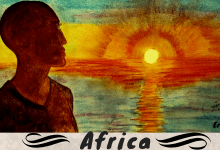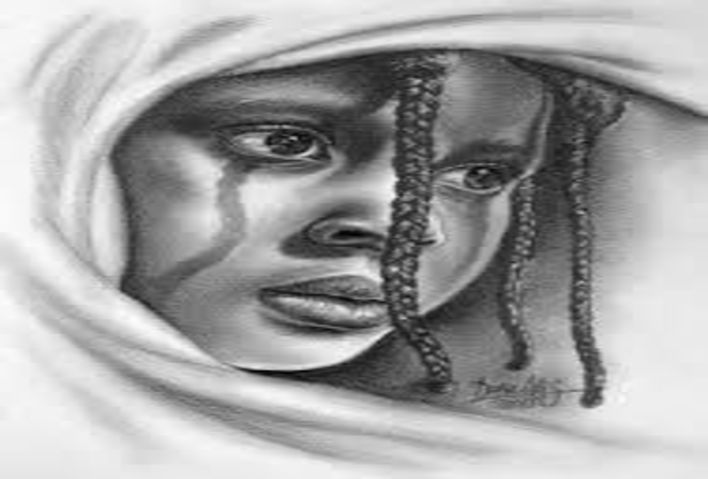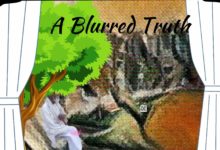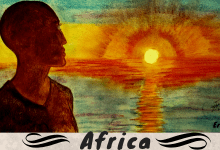Atrayee tells us an intriguing story about a NGC team, caught in the Eritrean-Ethiopian conflict and a kidnapping. What happened to Twisha? Here’s a literary thriller, exclusively for Different Truths, for the Africa Special Issue.

Is it night already? So soon! The trace of daylight that has been permeating through that precarious locked door suddenly drains out. Twisha slowly walks towards the door and knocks it three times as she has been instructed to do, when in need.
Hell! There is no response. Where is Senait? Has she gone? Left Twisha all alone to dig her grave amidst an impulsive war? Twisha knocks the door again. This time, a little harder. However, nothing comes in return. Neither Senait nor the consoling notes of her whispering voice. But an ominous loud noise streams through the door. Twisha slides down to the floor cupping her ears. Her eyes see the silhouettes of a yellow blaze through the crack of the door. Is this what people call the end, Death? Twisha assumes. Something churns within her; a dread, much more pungent than the pervading stench of singed cordite of spent shells piled up.
“Is there anyone to take me home?” Twisha cries her lungs out.
“Ssshhhh!” A distinct hiss bursts forth.
Is it a snake? Twisha quivers in fear. “Senait…Please help me…I mean no harm to Badme.”
“Dooo Nottt Talk.” A stiffened English dialect reaches Twisha and the door opens and shuts within a single breath.
Senait has come for her rescue; Twisha kindles a hope.
A barrage of artillery fire reverberates again in unison; if not longer, but for half an hour. Darkness thickens, so does the grimace of war; Eritrean-Ethiopian conflict, a fresh skirmish for an age old dispute. An impish yellow flame flickers at the other end of the room and there Twisha sees Senait lighting up a lantern. Hours’ long pursuit and Senait has come back with some taitas and a light; though a timid one as compared to the flaming blaze ruling the outer world, nonetheless needed to avoid any wild invasion.
“Drink some mies… You cry too much.” Senait hands a small cup of the local fermented beverage to Twisha. She clasps the cup and gulps it down hastily; so much that she ends up stifling to breathe.
“Peace…Peace…I take you home…Soon.” Senait comforts Twisha in her usual broken yet perceivable English.
“I shouldn’t have come here. Badme was a wrong choice.” Twisha mumbles with her teary eyes.
“Hey! Do not say that. Badme is beautiful. My home…It is beautiful.” Senait confronts. “This…is a small war…It ends soon. Do not worry…You can make film again.” She smiles, consoling Twisha, the only National Geographic Channel’s (NGC) intern who could escape the kidnapping by Ethiopian rebels.
Twisha, fatigued more emotionally than physically, fails to stoke her futile hope to be free. She stares at Senait but her senses, they are still mired over the morning’s incident.
Twisha’s team of four has been in the Horn of Africa for a documentary on endangered mammals. Near the Eritrean-Ethiopian border, Badme to be exact, residents have been discovering few aardvarks and African wild dogs meandering in search of food. Apparently, NGC’s cameras has captured their activities in Badme, framing a suitable climax for the film. Senait, being a tour guide from Tigray region, has come up to help the NGC team with the locals.
“You hungry?” Senait asks.
“Will they kill me too Senait? I am not any of you.”
“Ohh dear! Don’t cry.” Senait hugs Twisha. “I told Gerard. Today, Badme not safe…Sky colour bad in the morning…Tribes cautioned.”
How would the sky colour even determine future for the day? That too about a kidnapping. Twisha doesn’t understand.
Along with the mild breeze of January 2012, a few rumours of border discrepancies between Ethiopia and Eritrea have also been flowing in the air. And NGC has showed concern. More towards its team than on those ravenous and fervently relocating mammals. Gerard, the team lead, wishing to sew up the film shoot to avoid the political traps of these two hostile neighbours, has been out since the first light of dawn with the technicians, leaving Twisha in the safe hands of Senait in this abandoned hut quite far from their shooting spot.
“Do you have any water?” Twisha asks. “Mine is over.”
“You drink mies…Good.”
“That’s not water Senait.”
“This is Africa…We adapt as per our situation.” Senait gives Twisha some more mies.
The pretext of adaptation is pretty far from anticipating such a situation. Who on this earth would have expected this? Three perceivable European men, sans any political alliance, carrying a few slender sticks to shoo off any unwarranted animals and few cameras, suddenly get mobbed by some masked gunmen and abducted. What have they done?
“Why did they kidnap us?” Twisha brazens out. “We cannot solve your disputes. We had come to study your country… That’s all…Why making us a scapegoat?”
Outside, the bombing has stopped; probably a halt for the night. In that frail lustre of the lantern, Twisha sees her sole companion staring at her. She must be disappointed for responding to such redundant arguments.
“Nobody solves anything for us…They always study… Our poverty. How far we are from civilisation… or how close we are to the wild. Isn’t it?” Senait sighs.
Her words scoop out the crux of a brutal truth in that eerie silence. Twisha fails to counter for she, rather the whole world, knows how exploitation is synonymous to exploration in Africa. Be it in the Horn, the Sub-Saharan, the Central or the Cape. Post-colonial period, only the doctrine of slavery has been wiped out. Rather, it has been termed new abstracts; like serving to poverty, illiteracy, malnourishment, and counting on the long list of dearth.
Senait has stepped on the veritable minefield. The world studies Africa and its culture to widen the knowledge domain of human evolution. The world invests time and money to scrutinize how much more profits can be made through exploiting Africa’s lucrative resources conforming to its under-developed state and communal fights. The bigotry exploits in the name of God and the whole human race in the Cradle of Life strives under the fame of ritualistic superstitions. And then, there indeed exist a bunch of rich sororities who lend some inspiriting help such as charity towards education, health and their kin; much like paying a penance of their past misdeeds of the colonial era.
“Your friends are safe. No worry.” Senait gives a taita to Twisha.
“You know that!” Twisha wonders. “Do you belong to the same rebel group? What do you people want from us?” Twisha yells in pain for Gerard has trusted Senait.
“No harm…Trust me…We want to negotiate.” Senait paused to look at a starving Twisha who by now has forgotten all her table etiquettes while chomping off her taita.
“For what?” Twisha tones down in surprise.
Senait chortles and replies. “For Badme. For a better life in Eritrea. For our children to get food every day. For us to get full education…Not as a charity from the rich countries…But our own.”
“Wait! Eritrea?” Twisha’s eyes furled up. “You are Ethiopian. Right?”
“We are rebels…Want Badme to be in Eritrea.” Senait reclines on the wall with her taita and some mies.
Gosh! Leave aside her chance to go back, Twisha sees her mere survival akin to castles in the clouds.
Night has descended completely. The prevailing stillness in the ambience reflects an impatient wait for the first light of dawn, for the battle to take a new shape. Senait looks unflustered, busy eating away on the taitas. And Twisha, muddled between life and death fails to conceive anything apart from those susurrating ants on the floor. Are they observing her? Can they help her to escape? Do they know about the war? Ah! Endless question marks. Twisha senses nothing but a void, as if pushed to fall into an abysmal den. She doesn’t know who has pushed her but certainly worries, whether there’s anyone to catch her or not.
A sudden knock on the door shakes both of them. Even Senait seems to be naive. She enquires something. Twisha cannot surmise her words exactly but could understand that Senait is speaking Tigrinya. A male voice whispers behind the closed door and Senait opens the door. Twisha is scared stiff. Someone must have come to kill her. She snivels in fear and tries to be far from the lantern lest she should be found by the intruder.
A young boy enters the hut with water, a sizable packet of the paste what they call hilbet which is made from Faba beans and other legumes. A kind of their staple for a commoner. The boy smiles at Twisha and speaks something that bounces all over her ears but doesn’t make any sense.
“He says we are safe here. He has got some more food for you.” Senait translates to Twisha.
“How long I have to be like this?” Twisha stutters. Both Senait and the boy give her a blank smile. In a hut, as futile as the value of life outside, with no reach to the basic amenities, Twisha doesn’t need anyone to shoot or stab her. She can easily wane out of her life while controlling her bladder.
“I want to pee.” Twisha asks.
“Oh dear! Why did not tell me before?” Senait lifts Twisha up and takes her to the backyard.
The tiny yellow flame ruffles to live and the night slowly ebbs out in the company of Senait and her tales. Not the fairy tales but the slavery tales, the penury tales. The tales where innocence transforms into an imperishable mutiny.
Senait’s ancestors have toiled in the world of slavery many years ago. Her proficiency in Italian is a gift from her grandmother. As her grandmother has told, one of their masters was a kind lady who liked her grandmother a lot. With her own children, Senait’s grandmother was also taught some lessons. Senait must be true. The towns do have an impression of their Italian connection. Much prominent in Asmara, what they call “Little Rome”. Cafes, wide avenues, and a host of Italian restaurants. However, Badme and the borough around are quite sunken into nothingness. Life here is inclined towards livestock, agriculture and certainly rambling in dearth of basic human needs. Now, whom to blame? Senait hits the nail again. Eritrea or Ethiopia? Post-independence, no prolific development has happened. Badme has been placed under Ethiopian jurisdiction just as another border territory. Rebellions have slowly festered and Badme suffers this battle over its custody since many years now. Eritrea has been found to nurture that wish for Badme.
Before they could welcome the morning sun, two men have come to escort Senait and Twisha to a farther place. The Jeep runs and runs, crossing several miles uphill and halts into a community, demure enough to be called a village. Eyes blindfolded, mouth gagged and hands tied, and Twisha hears some human chattering. They all speak Tigrinya. Senait holds her hand and whispers into her ears. “You are safe here. Do not shout as I open you.”
Oh! So they are going to follow their ritualistic killing, sacrificing a human head to God so that Badme dispute wanes off. Twisha loses all her hopes until she sees Gerard sitting in a nearby courtyard and having a fun time with a bunch of kids.
Twisha runs to Gerard snubbing the gunslingers and Senait’s repeated calls. She holds Gerard, hugs him tight and cries aloud. He is alive along with the two other technicians. That gathers more substance than being abducted in an alien land.

It is a small village closer to the banks of River Meheb. Looks like a demarcated territory of the rebels as the outskirts are continuously monitored. Gerard and the other two are given a small house with a kitchenette and a hall where they sleep over a blanket. However, Twisha, being a woman is taken to Senait’s house. Her house too has the same arrangement along with a closed area which is supposedly the bathroom. Twisha finds her bliss in that makeshift loo. She has never imagined such hurdles when she actually desired to join the NGC’s Africa team.
Twisha, as fair as the bright sunlight, becomes a visual epiphany for the kids in the vicinity. They all have jostled around Senait’s house to have a glance. Twisha too find herself closer to life, closer to some solace over the coming days.
Every morning starts with a community prayer. Most of them make their way to the quaint Church, while a fragment belongs to Jeberti Muslim subgroup. One week has passed by and Twisha and her team become more like guests in the village. They share their Injerra bread from the same plate of the locals. Some days Gerard cooks wat for everyone. Twisha teaches English and basic Science to the kids in the evening. Life seems to be very simple these days. Wake up, work to get food, sing and dance in the evening with frequent coffee ceremonies and then bask in the dream world under the starry sky. Life has become very different but never difficult. Hiccups are there indeed. Perhaps in the sphere of luxury, or sometimes in basic sanitation. Still, Twisha is at peace; as if always wanted to be a part of this, though not the warmongering but the minimalism that prevails and relished as well.
Bombing at the border continues and life on the other hand slows down its pace. Food and water scarcity, basic hygiene has always been compromised and now it turns adverse. Children and elderly start ailing and bulla, their sagacious remedial drink fail to treat them. Before situation could worsen further Gerard and Twisha who have garnered a trusted post in the community plan to inculcate the basics of health and hygiene. The small school building that has been shut due to the border bombing opens up in the night for them to teach the elderly. Many do not know English and there, Senait’s help comes handy in translating.
In a few days’ time another set of European tourists get killed by the Eritrean troops and the UN Peace Keeping Force intervenes. Ethiopian rebels also succumb to the reality, a huge loss of life through this war and also the high maintenance cost. They decide to adjudicate their legal trials by handing over the NGC team to the UN forces.
Before having their next breakfast at the UN camp, Twisha and her team are bestowed with a grand farewell. Freshly brewed coffee, a grand (how much ever possible) feast with pasta, Injerra, Tsebhi, Dorho, Alicha and what not. By now Twisha identifies all of them by their mere appearance and if given a chance she can even cook for a grand Ethiopian-Eritrean feast. The battle-free air gets soaked in the mellifluous tunes on krar and mesenko. Senait and her peers join hands for their traditional dance, Eskista, the snake dance. Gerard too shakes a leg with the gang of girls. Twisha skims through the joy. Joy for what? For her freedom?
The music seems more eloquent than words. Their dance looks more compelling than mere gestures, expressing the most profound experience of being in a life, being a human first. Twisha witnesses it all. A melange of happiness, grief and faith gush through her veins. She doesn’t want to go back.
***
Twisha wakes up. Where is she? This is not Senait’s house. She looks around. Eyes droopy, she feels a stinging pain on her temples. Gerard is deep asleep on the next cot and a big lantern flutters on the table. What has happened? Her neurons could recall Senait offering her Tej, the honey wine, Twisha’s newly developed favourite drink. That’s it. Now in the middle of the night she finds herself in an unknown place.
Twisha tumbles down her cot and soon receives a warm wish from a military personnel. He is Colonel Enrick from the UNPKF rescue team.
Twisha is rescued? Why? How? When? Her head swirls. What has happened to Senait and her village? Are they bombed out? They had surrendered anyways, then why is she being told of a rescue?
“Where is Senait? How did I come here?” Twisha asks.
“Our Night Rangers team found four of you lying in the adjoining jungle. You are NGC, Right? We got your IDs with you. And none of you is Senait.” Col. Enrick replies anxiously.
“Huh! Yeah…I mean, yes we are the kidnapped ones. NGC.” Twisha fumbles as she still disbelieves to be thrown in the jungle after months long hospitality. Her eyes seize down a krar lying on the table.
“Whose is this?” Twisha rushes to the krar.
“This was in your hand when we found you.”
Twisha turns the krar around. That’s Senait’s. She used to play it. A note flaps at its base.
May good luck come to you – Senait!
“Good luck!” Twisha smiles. “I already have been with good luck Senait. Your name itself means good luck.” Twisha mutters.
If any day Stockholm syndrome searches for an acronym, Senait would fit the role. Senait and her tribe have never meant any harm to them. Leave aside killing, Twisha and her team were never ever starved. Things did turn sour for Twisha initially, nevertheless the same sourness turned into sweet memories in due course of time when she had to spend nights locked with a lantern and good luck.
Photos from the Internet
#ShortStory #Fiction #SpecialFeature #Africa #Story #DifferentTruths






 By
By
 By
By
 By
By
 By
By